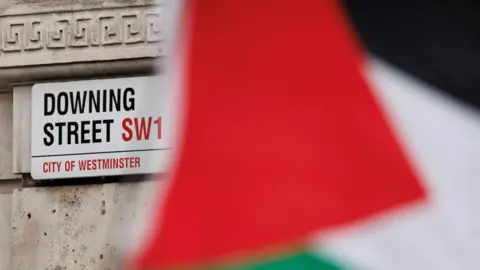The Current Dynamics of UK Politics Regarding Palestine
The delicate political landscape surrounding the UK’s stance on Palestine has witnessed notable shifts, primarily influenced by humanitarian crises, national sentiments, and internal pressure from various factions. Recently, Prime Minister Sir Keir Starmer’s announcement regarding the recognition of a Palestinian state has stirred debate, bringing forth the voices of those directly impacted by the ongoing conflict, including families of hostages.
A stark example is Emily Damari, who endured a harrowing fifteen months held captive in Gaza. Damari’s experiences have made her critical of Starmer’s recent statement, where he expressed the possibility of recognizing a Palestinian state by September, contingent upon Israel’s actions in the interim. She openly condemned this move as a “moral failure,” suggesting that it could inadvertently “reward terror” and extend the conflict without providing tangible benefits for peace.
This poignant criticism reflects the growing anxiety among British hostages’ families regarding the implications of altering the UK’s diplomatic position. In an open statement, representatives for ten hostages shared similar sentiments, arguing that the new position could diminish incentives for Hamas to engage in ceasefire talks or release remaining captives. They emphasize that a UK recognition of Palestine introduces uncertainties into negotiations, potentially complicating the humanitarian crisis and hostage situations.
Furthermore, the timing of Starmer’s announcement follows an emergency cabinet meeting, during which he outlined various prerequisites that Israel must meet for the UK to move forward with recognizing Palestinian statehood. These conditions include ceasing annexation efforts in the West Bank and committing to a long-term peace process alongside substantive humanitarian advancements in Gaza. Notably, the multi-faceted approach proposed by Starmer indicates that both Israeli and Hamas behaviors will factor into the UK’s assessment, making clear that the recognition of a Palestinian state hinges on actions from both sides, not solely on Israel’s compliance.
The ambiguity surrounding this stance was further highlighted in statements from government officials, notably Transport Secretary Heidi Alexander, who asserted that the onus lies with the Israeli government to act. Such declarations suggest a lack of coherence within the government’s messaging, as many believe the recognition of Palestine should not be contingent on Israel’s choices but rather acknowledged as an inalienable right of the Palestinian people.
Despite these varying perspectives, a consensus is forming within a significant faction of the parliamentary Labour Party. Over half of Labour MPs have openly urged the government to recognize Palestine, reflecting a broader movement within the party and a growing urgency to address humanitarian crises. The impending return of Parliament in September brings additional pressure, as the perceived need for action against the backdrop of international events could see opposition parties seeking to challenge the government’s position.
The political reality is this: internal pressures may compel the government towards recognition before resuming parliamentary activities, which would subsequently alter the UK’s diplomatic posture. This move, framed as a necessary shift towards advocating for peace and stability, must also navigate the complex realities of international relations and the ongoing humanitarian dilemmas in Gaza and the West Bank.
In summary, Sir Keir Starmer’s proposals signal a pivotal moment in UK politics regarding Palestine, characterized by competing narratives, humanitarian concerns, and the intricacies of party dynamics. As the government prepares to assess its position in September, the political consequences of recognition hang in the balance, intricately tied to the actions and responses of both Israel and Hamas. With public opinion likely to shift further as developments unfold, the responses from diplomats, political leaders, and citizens alike will be critical in determining the UK’s future involvement in the Israeli-Palestinian conflict.











